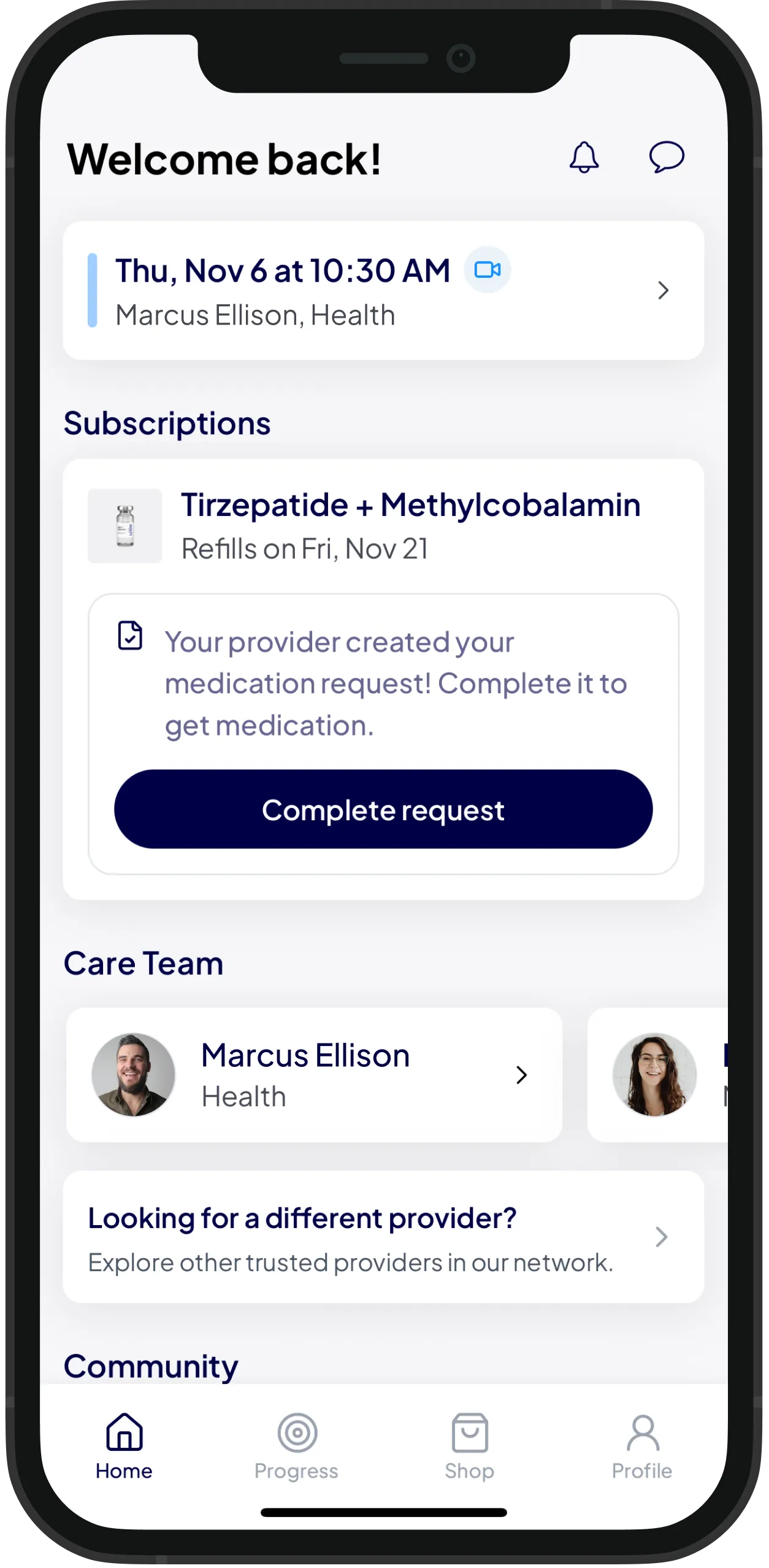Ready to transform your health?
Unlock access to expert guidance and a weight care plan crafted just for you.
Ready to transform your health?
Unlock access to expert guidance and a weight care plan crafted just for you.
Similar Articles
Similar Articles


GLP-1s for Pre-diabetes: Can You Prevent Type II Diabetes?
GLP-1s for Pre-diabetes: Can You Prevent Type II Diabetes?


Is Long-Term GLP-1 Use Safe? What 10-Year Data Suggests
Is Long-Term GLP-1 Use Safe? What 10-Year Data Suggests


GLP 1s and Cardiometabolic Health: How These Medications Support the Heart and Long Term Wellness
GLP 1s and Cardiometabolic Health: How These Medications Support the Heart and Long Term Wellness
Compounded medication
Compounded medication
Compounded medication
Updated on
Updated on
Updated on
Oct 23, 2024
Oct 23, 2024
Oct 23, 2024
What is the Best Injection for Weight Loss?
What is the Best Injection for Weight Loss?
What is the Best Injection for Weight Loss?
Discover the most effective weight loss injections, compare their efficacy, explore the science behind popular options, and learn how to choose the right one for your weight loss journey.
Discover the most effective weight loss injections, compare their efficacy, explore the science behind popular options, and learn how to choose the right one for your weight loss journey.
Discover the most effective weight loss injections, compare their efficacy, explore the science behind popular options, and learn how to choose the right one for your weight loss journey.



Table of Contents
Table of Contents
Table of Contents
An Overview of Available Weight Loss Injections
Comparing the Efficacy of Different Weight Loss Injections
The Science Behind the Most Popular Weight Loss Injections
How to Choose the Right Weight Loss Injection for You
An Overview of Available Weight Loss Injections
Comparing the Efficacy of Different Weight Loss Injections
The Science Behind the Most Popular Weight Loss Injections
How to Choose the Right Weight Loss Injection for You
An Overview of Available Weight Loss Injections
Comparing the Efficacy of Different Weight Loss Injections
The Science Behind the Most Popular Weight Loss Injections
How to Choose the Right Weight Loss Injection for You
In the realm of weight loss solutions, GLP-1 injections have emerged as a popular and effective method to aid individuals in their journey toward a healthier lifestyle.
Many existing weight loss medications are minimally effective and accompanied by unpleasant side effects, making adherence challenging for patients. However, a new class of medications known as GLP-1 agonists has gathered attention for their efficacy in promoting weight loss, especially when combined with diet and exercise.
Explore the options available and make an informed choice tailored to your needs. Here is a full breakdown of the key differences between various injections, covering their benefits and potential side effects.
An Overview of Available Weight Loss Injections
Keeping track of the various names of these medications can be challenging, so let’s break it down. The FDA initially approved these medications under brand names like Ozempic® and Mounjaro® to manage type 2 diabetes. Since then, they have been increasingly prescribed off-label for weight management. Manufacturers responded by developing new labels, including Wegovy® and Zepbound®, to obtain approval for treating obesity and overweight conditions.
They all belong to a class of medications known as GLP-1 receptor agonists, formulated using the active ingredients semaglutide, liraglutide, and tirzepatide. The injectable medications listed below are branded formulations containing one of these active ingredients.
Injectable Weight Loss Medications and Their Effectiveness
Ozempic® (Semaglutide)
This GLP-1 receptor agonist resulted in an average weight loss of 6.9% over a 56-week period (1).
Mounjaro® (Tirzepatide)
A GLP-1 and GIP receptor agonist produced an average weight loss of 15% by week 72 (2).
Zepbound® (Tirzepatide)
A GLP-1 and GIP receptor agonist resulted in an average weight loss of 26.7% by week 88 (3).
Saxenda (Liraglutide)
Similar to Semaglutide's action as a GLP-1 receptor agonist, it showed a 6.4% reduction in body weight after 68 weeks (4).
Wegovy® (Semaglutide)
A higher dose version of Semaglutide than Ozempic®, Wegovy® led to an average reduction of 15% in total body weight after 68 weeks (5).
It’s important to note that these medications were primarily compared to a placebo in these studies, and the duration of clinical trials varied. However, all injectable medications demonstrated significant weight loss effects. Additionally, these medications are most effective when combined with lifestyle changes such as regular exercise and healthier eating habits. This is because they help regulate the hormonal imbalances that often make it difficult for lifestyle changes to be effective.
The Science Behind the Most Popular Weight Loss Injections
Your body produces hormones known as incretins, including GLP-1 and GIP receptor agonists. These hormones bind to their corresponding receptors in a lock-and-key manner, triggering various effects on the body (6). The medications more robustly mimic the actions of these hormones to promote weight loss.
GLP-1 receptors are found in the pancreas, brain, stomach, liver, intestines, and muscles. GIP receptors, in addition to affecting the pancreas and intestines, also impact the skeleton and adipose (fat) tissue (7, 8).
These receptors are activated in different organs and stimulate several functions that contribute to overall fat loss:
Increases insulin: Stimulates a higher insulin level when blood sugar is too high, improving blood sugar regulation.
Decreases glucagon secretion: Reduces glucagon levels, preventing blood sugar from getting too high.
Slows down digestion: Slows the emptying of food from the stomach to increase satiety and keep you feeling full for a longer period of time.
Suppresses appetite: Acts on the brain to decrease appetite and control food cravings.
Enhanced satiety: Promotes feelings of fullness after meals.
Improves insulin sensitivity: Ensures your cells respond well to insulin which ultimately helps with reducing fat storage.
How to Choose the Right Weight Loss Injection for You
When choosing an injectable weight loss medication, there are plenty of options to consider. Across the board, injectable GLP-1 RA medications are highly effective in promoting weight loss. However, keep in mind that the numbers mentioned are averages. Everyone’s experience can be different – some might lose more weight, while others might lose less. Sometimes, people find the right medication for them right away, but others might need to try different ones for reasons like how well it works, how they tolerate it, side effects, or insurance coverage. A licensed healthcare professional is essential to guide you through your weight loss journey.
Mochi Health, a leading obesity medicine practice, offers access to these medications through our team of board-certified physicians. Our tailored approach is personalized and grounded in scientific evidence, empowering patients to achieve sustainable weight loss and improve their overall health. At Mochi Health, our team of medical professionals and obesity medicine experts ensures that every patient receives personalized care and access to the most effective and suitable medications delivered directly to their door.
Whether you plan to use insurance or pay out-of-pocket, Mochi Health offers flexible plans and affordable alternatives to accommodate your financial situation and health objectives.
Choosing a weight loss injection is a significant step toward achieving your health goals. Under the guidance of the experts at Mochi Health, you'll receive the support, knowledge, and medical assistance needed to make informed choices about your wellness journey. Find out if you’re eligible for the program and get started today.
This post was written by our team of health writers for informational purposes only and does not constitute medical advice. Always consult your doctor or healthcare provider for personalized guidance regarding your health. Ozempic®, Wegovy®, Mounjaro®, and Zepbound® and their delivery device are registered trademarks. Mochi Health is a telehealth clinic that offers prescriptions for these products by medical necessity only as determined by a licensed health provider.
Sources
Marso, S. P., Bain, S. C., Consoli, A., Eliaschewitz, F. G., Jódar, E., Leiter, L. A., Lingvay, I., Rosenstock, J., Seufert, J., Warren, M. L., Woo, V., Hansen, O., Holst, A. G., Pettersson, J., & Vilsbøll, T. (2016). Semaglutide and Cardiovascular Outcomes in Patients with Type 2 Diabetes. The New England Journal of Medicine, 375(19), 1834–1844. https://doi.org/10.1056/NEJMoa1607141
Jastreboff, A. M., Aronne, L. J., & Stefanski, A. (2022). Tirzepatide Once Weekly for the Treatment of Obesity. Reply. The New England Journal of Medicine, 387(15), 1434–1435. https://doi.org/10.1056/NEJMc2211120
Jastreboff, A. M., Aronne, L. J., & Stefanski, A. (2022). Tirzepatide Once Weekly for the Treatment of Obesity. Reply. The New England Journal of Medicine, 387(15), 1434–1435. https://doi.org/10.1056/NEJMc2211120
Rubino, D. M., Greenway, F. L., Khalid, U., O’Neil, P. M., Rosenstock, J., Sørrig, R., Wadden, T. A., Wizert, A., & Garvey, W. T. (2022). Effect of Weekly Subcutaneous Semaglutide vs Daily Liraglutide on Body Weight in Adults With Overweight or Obesity Without Diabetes: The STEP 8 Randomized Clinical Trial. JAMA : The Journal of the American Medical Association, 327(2), 138–150. https://doi.org/10.1001/jama.2021.23619
Wilding, J. P. H., Batterham, R. L., Calanna, S., Davies, M., Van Gaal, L. F., Lingvay, I., McGowan, B. M., Rosenstock, J., Tran, M. T. D., Wadden, T. A., Wharton, S., Yokote, K., Zeuthen, N., & Kushner, R. F. (2021). Once-Weekly Semaglutide in Adults with Overweight or Obesity. The New England Journal of Medicine, 384(11), 989–1002. https://doi.org/10.1056/NEJMoa2032183
Seino, Y., Fukushima, M., & Yabe, D. (2010). GIP and GLP‐1, the two incretin hormones: Similarities and differences. Journal of Diabetes Investigation, 1(1‐2), 8–23. https://doi.org/10.1111/j.2040-1124.2010.00022.x
Muzurović, E. M., Volčanšek, Š., Tomšić, K. Z., Janež, A., Mikhailidis, D. P., Rizzo, M., & Mantzoros, C. S. (2022). Glucagon-Like Peptide-1 Receptor Agonists and Dual Glucose-Dependent Insulinotropic Polypeptide/Glucagon-Like Peptide-1 Receptor Agonists in the Treatment of Obesity/Metabolic Syndrome, Prediabetes/Diabetes and Non-Alcoholic Fatty Liver Disease—Current Evidence. Journal of Cardiovascular Pharmacology and Therapeutics, 27, 10742484221146371–10742484221146371. https://doi.org/10.1177/10742484221146371
Nauck, M. A., Quast, D. R., Wefers, J., & Pfeiffer, A. F. H. (2021). The evolving story of incretins (GIP and GLP‐1) in metabolic and cardiovascular disease: A pathophysiological update. Diabetes, Obesity & Metabolism, 23(S3), 5–29. https://doi.org/10.1111/dom.14496
In the realm of weight loss solutions, GLP-1 injections have emerged as a popular and effective method to aid individuals in their journey toward a healthier lifestyle.
Many existing weight loss medications are minimally effective and accompanied by unpleasant side effects, making adherence challenging for patients. However, a new class of medications known as GLP-1 agonists has gathered attention for their efficacy in promoting weight loss, especially when combined with diet and exercise.
Explore the options available and make an informed choice tailored to your needs. Here is a full breakdown of the key differences between various injections, covering their benefits and potential side effects.
An Overview of Available Weight Loss Injections
Keeping track of the various names of these medications can be challenging, so let’s break it down. The FDA initially approved these medications under brand names like Ozempic® and Mounjaro® to manage type 2 diabetes. Since then, they have been increasingly prescribed off-label for weight management. Manufacturers responded by developing new labels, including Wegovy® and Zepbound®, to obtain approval for treating obesity and overweight conditions.
They all belong to a class of medications known as GLP-1 receptor agonists, formulated using the active ingredients semaglutide, liraglutide, and tirzepatide. The injectable medications listed below are branded formulations containing one of these active ingredients.
Injectable Weight Loss Medications and Their Effectiveness
Ozempic® (Semaglutide)
This GLP-1 receptor agonist resulted in an average weight loss of 6.9% over a 56-week period (1).
Mounjaro® (Tirzepatide)
A GLP-1 and GIP receptor agonist produced an average weight loss of 15% by week 72 (2).
Zepbound® (Tirzepatide)
A GLP-1 and GIP receptor agonist resulted in an average weight loss of 26.7% by week 88 (3).
Saxenda (Liraglutide)
Similar to Semaglutide's action as a GLP-1 receptor agonist, it showed a 6.4% reduction in body weight after 68 weeks (4).
Wegovy® (Semaglutide)
A higher dose version of Semaglutide than Ozempic®, Wegovy® led to an average reduction of 15% in total body weight after 68 weeks (5).
It’s important to note that these medications were primarily compared to a placebo in these studies, and the duration of clinical trials varied. However, all injectable medications demonstrated significant weight loss effects. Additionally, these medications are most effective when combined with lifestyle changes such as regular exercise and healthier eating habits. This is because they help regulate the hormonal imbalances that often make it difficult for lifestyle changes to be effective.
The Science Behind the Most Popular Weight Loss Injections
Your body produces hormones known as incretins, including GLP-1 and GIP receptor agonists. These hormones bind to their corresponding receptors in a lock-and-key manner, triggering various effects on the body (6). The medications more robustly mimic the actions of these hormones to promote weight loss.
GLP-1 receptors are found in the pancreas, brain, stomach, liver, intestines, and muscles. GIP receptors, in addition to affecting the pancreas and intestines, also impact the skeleton and adipose (fat) tissue (7, 8).
These receptors are activated in different organs and stimulate several functions that contribute to overall fat loss:
Increases insulin: Stimulates a higher insulin level when blood sugar is too high, improving blood sugar regulation.
Decreases glucagon secretion: Reduces glucagon levels, preventing blood sugar from getting too high.
Slows down digestion: Slows the emptying of food from the stomach to increase satiety and keep you feeling full for a longer period of time.
Suppresses appetite: Acts on the brain to decrease appetite and control food cravings.
Enhanced satiety: Promotes feelings of fullness after meals.
Improves insulin sensitivity: Ensures your cells respond well to insulin which ultimately helps with reducing fat storage.
How to Choose the Right Weight Loss Injection for You
When choosing an injectable weight loss medication, there are plenty of options to consider. Across the board, injectable GLP-1 RA medications are highly effective in promoting weight loss. However, keep in mind that the numbers mentioned are averages. Everyone’s experience can be different – some might lose more weight, while others might lose less. Sometimes, people find the right medication for them right away, but others might need to try different ones for reasons like how well it works, how they tolerate it, side effects, or insurance coverage. A licensed healthcare professional is essential to guide you through your weight loss journey.
Mochi Health, a leading obesity medicine practice, offers access to these medications through our team of board-certified physicians. Our tailored approach is personalized and grounded in scientific evidence, empowering patients to achieve sustainable weight loss and improve their overall health. At Mochi Health, our team of medical professionals and obesity medicine experts ensures that every patient receives personalized care and access to the most effective and suitable medications delivered directly to their door.
Whether you plan to use insurance or pay out-of-pocket, Mochi Health offers flexible plans and affordable alternatives to accommodate your financial situation and health objectives.
Choosing a weight loss injection is a significant step toward achieving your health goals. Under the guidance of the experts at Mochi Health, you'll receive the support, knowledge, and medical assistance needed to make informed choices about your wellness journey. Find out if you’re eligible for the program and get started today.
This post was written by our team of health writers for informational purposes only and does not constitute medical advice. Always consult your doctor or healthcare provider for personalized guidance regarding your health. Ozempic®, Wegovy®, Mounjaro®, and Zepbound® and their delivery device are registered trademarks. Mochi Health is a telehealth clinic that offers prescriptions for these products by medical necessity only as determined by a licensed health provider.
Sources
Marso, S. P., Bain, S. C., Consoli, A., Eliaschewitz, F. G., Jódar, E., Leiter, L. A., Lingvay, I., Rosenstock, J., Seufert, J., Warren, M. L., Woo, V., Hansen, O., Holst, A. G., Pettersson, J., & Vilsbøll, T. (2016). Semaglutide and Cardiovascular Outcomes in Patients with Type 2 Diabetes. The New England Journal of Medicine, 375(19), 1834–1844. https://doi.org/10.1056/NEJMoa1607141
Jastreboff, A. M., Aronne, L. J., & Stefanski, A. (2022). Tirzepatide Once Weekly for the Treatment of Obesity. Reply. The New England Journal of Medicine, 387(15), 1434–1435. https://doi.org/10.1056/NEJMc2211120
Jastreboff, A. M., Aronne, L. J., & Stefanski, A. (2022). Tirzepatide Once Weekly for the Treatment of Obesity. Reply. The New England Journal of Medicine, 387(15), 1434–1435. https://doi.org/10.1056/NEJMc2211120
Rubino, D. M., Greenway, F. L., Khalid, U., O’Neil, P. M., Rosenstock, J., Sørrig, R., Wadden, T. A., Wizert, A., & Garvey, W. T. (2022). Effect of Weekly Subcutaneous Semaglutide vs Daily Liraglutide on Body Weight in Adults With Overweight or Obesity Without Diabetes: The STEP 8 Randomized Clinical Trial. JAMA : The Journal of the American Medical Association, 327(2), 138–150. https://doi.org/10.1001/jama.2021.23619
Wilding, J. P. H., Batterham, R. L., Calanna, S., Davies, M., Van Gaal, L. F., Lingvay, I., McGowan, B. M., Rosenstock, J., Tran, M. T. D., Wadden, T. A., Wharton, S., Yokote, K., Zeuthen, N., & Kushner, R. F. (2021). Once-Weekly Semaglutide in Adults with Overweight or Obesity. The New England Journal of Medicine, 384(11), 989–1002. https://doi.org/10.1056/NEJMoa2032183
Seino, Y., Fukushima, M., & Yabe, D. (2010). GIP and GLP‐1, the two incretin hormones: Similarities and differences. Journal of Diabetes Investigation, 1(1‐2), 8–23. https://doi.org/10.1111/j.2040-1124.2010.00022.x
Muzurović, E. M., Volčanšek, Š., Tomšić, K. Z., Janež, A., Mikhailidis, D. P., Rizzo, M., & Mantzoros, C. S. (2022). Glucagon-Like Peptide-1 Receptor Agonists and Dual Glucose-Dependent Insulinotropic Polypeptide/Glucagon-Like Peptide-1 Receptor Agonists in the Treatment of Obesity/Metabolic Syndrome, Prediabetes/Diabetes and Non-Alcoholic Fatty Liver Disease—Current Evidence. Journal of Cardiovascular Pharmacology and Therapeutics, 27, 10742484221146371–10742484221146371. https://doi.org/10.1177/10742484221146371
Nauck, M. A., Quast, D. R., Wefers, J., & Pfeiffer, A. F. H. (2021). The evolving story of incretins (GIP and GLP‐1) in metabolic and cardiovascular disease: A pathophysiological update. Diabetes, Obesity & Metabolism, 23(S3), 5–29. https://doi.org/10.1111/dom.14496
In the realm of weight loss solutions, GLP-1 injections have emerged as a popular and effective method to aid individuals in their journey toward a healthier lifestyle.
Many existing weight loss medications are minimally effective and accompanied by unpleasant side effects, making adherence challenging for patients. However, a new class of medications known as GLP-1 agonists has gathered attention for their efficacy in promoting weight loss, especially when combined with diet and exercise.
Explore the options available and make an informed choice tailored to your needs. Here is a full breakdown of the key differences between various injections, covering their benefits and potential side effects.
An Overview of Available Weight Loss Injections
Keeping track of the various names of these medications can be challenging, so let’s break it down. The FDA initially approved these medications under brand names like Ozempic® and Mounjaro® to manage type 2 diabetes. Since then, they have been increasingly prescribed off-label for weight management. Manufacturers responded by developing new labels, including Wegovy® and Zepbound®, to obtain approval for treating obesity and overweight conditions.
They all belong to a class of medications known as GLP-1 receptor agonists, formulated using the active ingredients semaglutide, liraglutide, and tirzepatide. The injectable medications listed below are branded formulations containing one of these active ingredients.
Injectable Weight Loss Medications and Their Effectiveness
Ozempic® (Semaglutide)
This GLP-1 receptor agonist resulted in an average weight loss of 6.9% over a 56-week period (1).
Mounjaro® (Tirzepatide)
A GLP-1 and GIP receptor agonist produced an average weight loss of 15% by week 72 (2).
Zepbound® (Tirzepatide)
A GLP-1 and GIP receptor agonist resulted in an average weight loss of 26.7% by week 88 (3).
Saxenda (Liraglutide)
Similar to Semaglutide's action as a GLP-1 receptor agonist, it showed a 6.4% reduction in body weight after 68 weeks (4).
Wegovy® (Semaglutide)
A higher dose version of Semaglutide than Ozempic®, Wegovy® led to an average reduction of 15% in total body weight after 68 weeks (5).
It’s important to note that these medications were primarily compared to a placebo in these studies, and the duration of clinical trials varied. However, all injectable medications demonstrated significant weight loss effects. Additionally, these medications are most effective when combined with lifestyle changes such as regular exercise and healthier eating habits. This is because they help regulate the hormonal imbalances that often make it difficult for lifestyle changes to be effective.
The Science Behind the Most Popular Weight Loss Injections
Your body produces hormones known as incretins, including GLP-1 and GIP receptor agonists. These hormones bind to their corresponding receptors in a lock-and-key manner, triggering various effects on the body (6). The medications more robustly mimic the actions of these hormones to promote weight loss.
GLP-1 receptors are found in the pancreas, brain, stomach, liver, intestines, and muscles. GIP receptors, in addition to affecting the pancreas and intestines, also impact the skeleton and adipose (fat) tissue (7, 8).
These receptors are activated in different organs and stimulate several functions that contribute to overall fat loss:
Increases insulin: Stimulates a higher insulin level when blood sugar is too high, improving blood sugar regulation.
Decreases glucagon secretion: Reduces glucagon levels, preventing blood sugar from getting too high.
Slows down digestion: Slows the emptying of food from the stomach to increase satiety and keep you feeling full for a longer period of time.
Suppresses appetite: Acts on the brain to decrease appetite and control food cravings.
Enhanced satiety: Promotes feelings of fullness after meals.
Improves insulin sensitivity: Ensures your cells respond well to insulin which ultimately helps with reducing fat storage.
How to Choose the Right Weight Loss Injection for You
When choosing an injectable weight loss medication, there are plenty of options to consider. Across the board, injectable GLP-1 RA medications are highly effective in promoting weight loss. However, keep in mind that the numbers mentioned are averages. Everyone’s experience can be different – some might lose more weight, while others might lose less. Sometimes, people find the right medication for them right away, but others might need to try different ones for reasons like how well it works, how they tolerate it, side effects, or insurance coverage. A licensed healthcare professional is essential to guide you through your weight loss journey.
Mochi Health, a leading obesity medicine practice, offers access to these medications through our team of board-certified physicians. Our tailored approach is personalized and grounded in scientific evidence, empowering patients to achieve sustainable weight loss and improve their overall health. At Mochi Health, our team of medical professionals and obesity medicine experts ensures that every patient receives personalized care and access to the most effective and suitable medications delivered directly to their door.
Whether you plan to use insurance or pay out-of-pocket, Mochi Health offers flexible plans and affordable alternatives to accommodate your financial situation and health objectives.
Choosing a weight loss injection is a significant step toward achieving your health goals. Under the guidance of the experts at Mochi Health, you'll receive the support, knowledge, and medical assistance needed to make informed choices about your wellness journey. Find out if you’re eligible for the program and get started today.
This post was written by our team of health writers for informational purposes only and does not constitute medical advice. Always consult your doctor or healthcare provider for personalized guidance regarding your health. Ozempic®, Wegovy®, Mounjaro®, and Zepbound® and their delivery device are registered trademarks. Mochi Health is a telehealth clinic that offers prescriptions for these products by medical necessity only as determined by a licensed health provider.
Sources
Marso, S. P., Bain, S. C., Consoli, A., Eliaschewitz, F. G., Jódar, E., Leiter, L. A., Lingvay, I., Rosenstock, J., Seufert, J., Warren, M. L., Woo, V., Hansen, O., Holst, A. G., Pettersson, J., & Vilsbøll, T. (2016). Semaglutide and Cardiovascular Outcomes in Patients with Type 2 Diabetes. The New England Journal of Medicine, 375(19), 1834–1844. https://doi.org/10.1056/NEJMoa1607141
Jastreboff, A. M., Aronne, L. J., & Stefanski, A. (2022). Tirzepatide Once Weekly for the Treatment of Obesity. Reply. The New England Journal of Medicine, 387(15), 1434–1435. https://doi.org/10.1056/NEJMc2211120
Jastreboff, A. M., Aronne, L. J., & Stefanski, A. (2022). Tirzepatide Once Weekly for the Treatment of Obesity. Reply. The New England Journal of Medicine, 387(15), 1434–1435. https://doi.org/10.1056/NEJMc2211120
Rubino, D. M., Greenway, F. L., Khalid, U., O’Neil, P. M., Rosenstock, J., Sørrig, R., Wadden, T. A., Wizert, A., & Garvey, W. T. (2022). Effect of Weekly Subcutaneous Semaglutide vs Daily Liraglutide on Body Weight in Adults With Overweight or Obesity Without Diabetes: The STEP 8 Randomized Clinical Trial. JAMA : The Journal of the American Medical Association, 327(2), 138–150. https://doi.org/10.1001/jama.2021.23619
Wilding, J. P. H., Batterham, R. L., Calanna, S., Davies, M., Van Gaal, L. F., Lingvay, I., McGowan, B. M., Rosenstock, J., Tran, M. T. D., Wadden, T. A., Wharton, S., Yokote, K., Zeuthen, N., & Kushner, R. F. (2021). Once-Weekly Semaglutide in Adults with Overweight or Obesity. The New England Journal of Medicine, 384(11), 989–1002. https://doi.org/10.1056/NEJMoa2032183
Seino, Y., Fukushima, M., & Yabe, D. (2010). GIP and GLP‐1, the two incretin hormones: Similarities and differences. Journal of Diabetes Investigation, 1(1‐2), 8–23. https://doi.org/10.1111/j.2040-1124.2010.00022.x
Muzurović, E. M., Volčanšek, Š., Tomšić, K. Z., Janež, A., Mikhailidis, D. P., Rizzo, M., & Mantzoros, C. S. (2022). Glucagon-Like Peptide-1 Receptor Agonists and Dual Glucose-Dependent Insulinotropic Polypeptide/Glucagon-Like Peptide-1 Receptor Agonists in the Treatment of Obesity/Metabolic Syndrome, Prediabetes/Diabetes and Non-Alcoholic Fatty Liver Disease—Current Evidence. Journal of Cardiovascular Pharmacology and Therapeutics, 27, 10742484221146371–10742484221146371. https://doi.org/10.1177/10742484221146371
Nauck, M. A., Quast, D. R., Wefers, J., & Pfeiffer, A. F. H. (2021). The evolving story of incretins (GIP and GLP‐1) in metabolic and cardiovascular disease: A pathophysiological update. Diabetes, Obesity & Metabolism, 23(S3), 5–29. https://doi.org/10.1111/dom.14496
Read next
Ready to transform your health?
Unlock access to expert guidance and a weight care plan crafted just for you.

Ready to transform your health?
Unlock access to expert guidance and a weight care plan crafted just for you.

Ready to transform your health?
Unlock access to expert guidance and a weight care plan crafted just for you.


© 2026 Mochi Health
All professional medical services are provided by licensed physicians and clinicians affiliated with independently owned and operated professional practices. Mochi Health Corp. provides administrative and technology services to affiliated medical practices it supports, and does not provide any professional medical services itself.


© 2026 Mochi Health
All professional medical services are provided by licensed physicians and clinicians affiliated with independently owned and operated professional practices. Mochi Health Corp. provides administrative and technology services to affiliated medical practices it supports, and does not provide any professional medical services itself.


© 2026 Mochi Health
All professional medical services are provided by licensed physicians and clinicians affiliated with independently owned and operated professional practices. Mochi Health Corp. provides administrative and technology services to affiliated medical practices it supports, and does not provide any professional medical services itself.

















